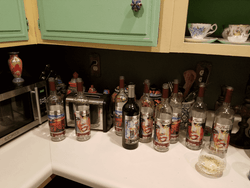Wine lovers know that drinking wine is more of a lifestyle than it is just a simple decision. There is an art to not only the making of wine but also to enjoying it. It doesn’t come without a flurry of questions about wine and wine culture, however. The complexity of the flavor profiles and the sometimes ritual-like drinking of it – honestly, it can be a bit intimidating to newcomers. Not to worry, appreciating wine is the first step, and as for the rest? We’ve got you covered.
Here are the top 15 most asked questions about wine – answered for you.
15. Sulfites, what are they and are they dangerous?
Sulfites are naturally occurring chemical compounds found in wine. Although to a varying degree, sulfites are found in all wine. They are the lowest in red wines while sweet white wine has the highest sulfite content. They are not dangerous, though rarely can cause a mild allergic reaction.
14. Does the quality of the wine glass really make a difference?
That is going to largely depend on who you ask – according to Georg Reidel, the head of an eleven generation Austrian glass-making dynasty, claims that the shape of the wine glass is what truly matters. Smaller glasses tend to heighten the intensity while larger wine glasses encourage a more aromatic complexity.
13. Why aren’t all wines vegan?
Many wines cannot be considered vegan nor vegetarian due to something called the ‘fining’ process. Considering some of the most common fining agents are not acceptable for veganism or vegetarianism – such as milk protein, animal proteins, egg whites, and fish bladder protein – it makes sense.
12. How long does wine last once opened?
Generally, an opened bottle of wine will last from 5 to 7 days if stored in the fridge. As time passes, and as the wine oxidizes, there will be subtle taste changes. Particularly, the fruitiness dissipates and the vibrancy diminishes over time.
11. How should I store my wine?
Another common question about wine concerns storage. Unopened bottles should be kept in a dry, dark place with low humidity and at the proper temperature. Be sure they are not stored in an upright position. Bottles that have been opened can be stored in the refrigerator for up to a week.
10. What does “vintage” mean?
Vintage, with regards to wine, does not mean ‘old’. Vintage is merely referring to the year the grapes were harvested – all the grapes in a vintage wine were all or mostly grown and harvested in the same year. On the other hand, a wine that is not vintage would be a blend of harvests from several different years.
9. Is drinking wine good for you?
So long as it is in moderation, a red wine actually offers several benefits, including protecting against heart disease and inflammation, lower cholesterol, and has more antioxidants than white wine.
8. What’s the best wine?
That will always be a personal preference and there is no right, or wrong, answer. The best wine is one that you enjoy!
7. What are legs?
Again, depending on exactly who you ask, legs in wine usually signifies a high alcohol content or high sugar content. The “legs,” are caused by alcohol evaporation and as a result, droplets can be observed running down the sides of a wine glass.
6. What’s the best way to learn about wine?
That is one of the beauties of the wine world, there are so many different ways to experience, and learn about, different wines and how they are made. Wineries, wine tastings, festivals, you name it. There is a whole wine culture to explore.
5. What is tannin?
Tannins are one group of phenolic compounds, acquired from the skin, seeds, and stems of the grapes. They are of distinct importance concerning how a specific wine is going to taste after the aging process. Tannins are a natural preservative and give the wine a dry feel, which is especially apparent in the aftertaste of most red wines (that well-known dried-out mouth feeling). Although both red and white wines have tannins, it is considerably more apparent in red wine varieties.
4. Do all wines get better with age?
This is one of the most asked questions about wine. As any wine goes through the aging process, it triggers a complex chemical reaction among the acids, sugars, and substances known as phenolic compounds. These phenolic compounds can not only alter the taste of (usually for the better, but not always) but the aroma and coloring as well. Higher phenol levels in wine (certain types of Syrah, Nebbiolo) mean that it will age well. Lower phenol level wine will typically not age very well. A wine that ages extraordinarily, or those that are ‘built to age’, are incredibly rare.
3. Does Price Really Matter?
Although the quality is, quite obviously, going to be higher, many of the grapes used in the making of expensive wines are from the same vineyard as those used to make cheaper varieties. They are sometimes crafted by the same winemaker as well. Generally, the higher the price tag, the more notable the aromas and the more vibrant the flavors.
2. What are the most important things to consider when pairing wine with food?
Despite, again, being more of personal preference, there are commonly known guidelines when pairing certain food with specific varieties of wine, mainly, the foods need to match the wine in flavor intensity. Red wines pair well with bold flavors and meats, while white goes well with lighter meats such as chicken and/or fish.
1. Is it Bad to Drink Cheap Wine?
Define bad… Is it going to kill you? No, but it might just make you feel like you’re dying. The taste isn’t likely to be very good either. There are plenty of decently-priced options without getting into inferior territory. There’s affordable and then there’s ‘you might as well be drinking cleaner’. Pay a couple of extra bucks, you’ll thank yourself in the morning.
There you have it – knowledge is power and you are well on your way to wine connoisseur status. I think that calls for a celebration, don’t you? Time to pop open a bottle, sit back, relax, and savor the moment. After all, living in the moment is what it is truly all about. Be sure to check out all of other blog articles to get all your questions about wine answered. Cheers!





